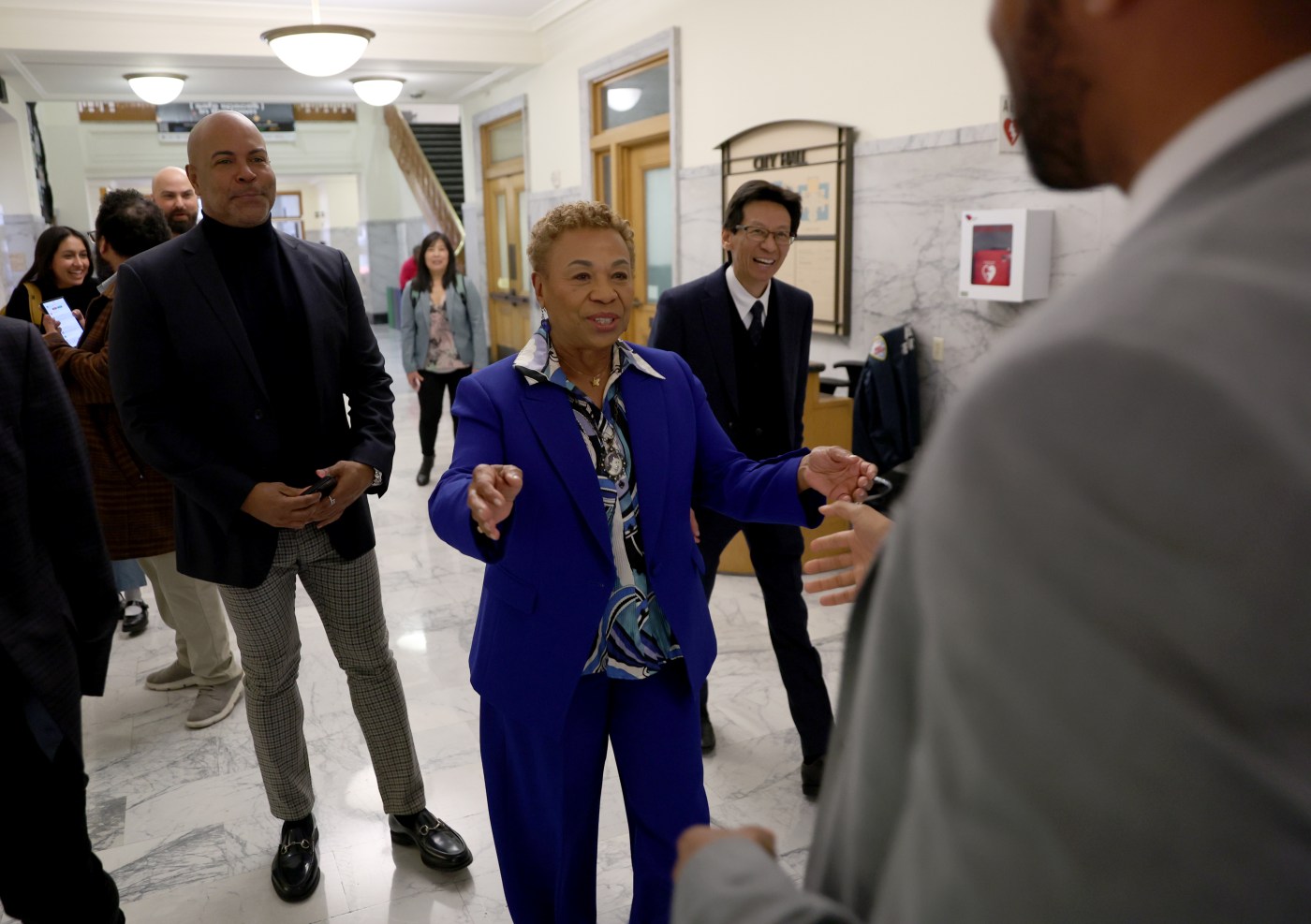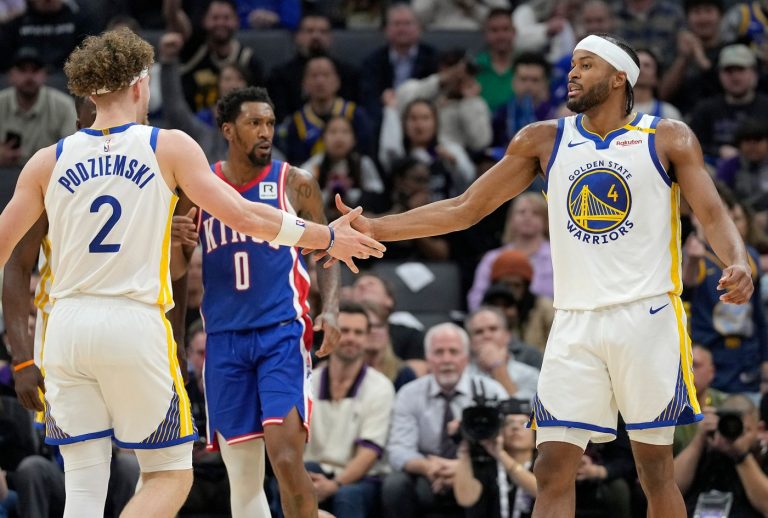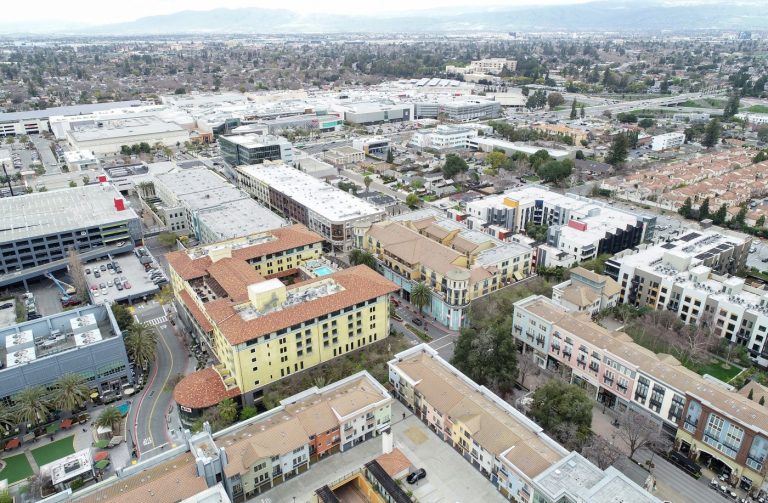OAKLAND — So far, things are going as planned for the community leaders and elected officials who had urged former Congresswoman Barbara Lee to run to be Oakland’s mayor.
Her candidacy alone immediately prompted most other realistic prospects to exit the race, leaving a relatively smoother path — in a short window ahead of the April 15 special election — for the progressive heavyweight.
Lee, who is 78 and fresh off 26 years in Congress, hasn’t budged from explaining her interest in being mayor as a desire to get Oakland back on track, even as critics question her knowledge of city matters.
Now the longtime elected official will be expected to demonstrate to voters her understanding of the town where she attended college five decades ago but has sparingly lived during her time representing the East Bay in Washington, D.C.
Last week, Lee released for the first time a policy platform that runs down some broad proposals, such as a team that would establish “a new, coordinated framework” for homelessness and a promise to cut “bureaucratic inefficiencies” that prevent sworn police officers from being on patrol.
“Police officers should prioritize investigating gun crimes, arresting dangerous fugitives and ending gun violence,” her public safety policy list states. In an interview, she described her intent to unpack why officers rack up so much overtime pay.
Her platform also promises ethics, transparency and accountability, pointedly alluding to a corruption scandal involving former Mayor Sheng Thao.
Lee, in the fall, had opposed the recall of Thao, whose proximity to an FBI criminal investigation was known to voters at the time. More recently, after Thao was charged with felonies in January, Lee has sought to present herself in contrast to the former mayor.
Former Rep. Barbara Lee poses for a photo with Interim Mayor Kevin Jenkins, to her left, and others, at City Hall after Lee filed paperwork to run for mayor in Oakland, Calif., on Wednesday, Jan. 8, 2025. To the right is Fluid 510 bar owner Richard Fuentes and to the left is Chinatown Chamber Of Commerce President Carl Chan. (Jane Tyska/Bay Area News Group)
The election is now less than eight weeks away, but City Hall’s focus appears fixed on the fallout of a budget crisis, including the layoffs of 100 city workers, closure of fire stations and slashing of $2.6 million in funding for some longstanding local nonprofits.
Whoever wins the 10-candidate mayoral race — widely seen as being between Lee and former Councilmember Loren Taylor — would almost immediately be expected to begin work proposing a city budget for the next two years.
Oakland’s current budget cycle amounts to roughly $4.2 billion in spending, which city officials are now aggressively looking to reduce after years of applying band-aids.
In an interview, Lee came out strongly against reducing city jobs as part of that process.
“Laying off people,” she said, “would be the last sort of cut I would ever want to make. We need to get this budget on track and increase revenue — and make sure workers are not impacted.”
The former congresswoman’s campaign, formed in January, won’t be expected to report its initial finances until March 6. In the meantime, labor money has poured into a San Francisco-based political committee, Supporters of Barbara Lee for Oakland Mayor 2025.
Since last month, the committee has raised $50,000 from each of Oakland’s two largest public-employee labor unions, SEIU 1021 and IFPTE Local 21, along with $10,000 from the city firefighters union. It has also received $10,000 from Pacific Gas and Electric Co.
Taylor, whose campaign had raised $57,000 through Dec. 31, does not yet have independent committees raising money for him.
Oakland Mayor candidate Loren Taylor speaks to the media at the same time former Oakland Mayor Sheng Thao appears at the Federal Courthouse in Oakland, Calif. on Friday, Jan. 17, 2025. (Ray Chavez/Bay Area News Group)
To address the city’s spending, Lee wants a forensic audit to identify “waste in our departments,” but she spoke in more detail about adding revenue streams and supports a new sales tax before voters in the April 15 election.
She also promised a new division in the mayor’s office that would develop public-private partnerships.
Asked which existing revenue sources are vitally important to the city, Lee said “they all are,” noting that “we’re looking at revenue that’s not being collected from traffic fines and meters.”
While revenue from parking citations did slightly decline in the current fiscal year’s first quarter compared to the year before, the largest recent revenue shortfalls in the city are from taxes on real-estate transfers and business licenses.
The pandemic, Lee said, contributed a great deal to Oakland’s economic problems. But a fix proposed by Thao last summer — expediting a planned sale of the Coliseum to pay city salaries with the revenue — was just one example of the city “robbing Peter to pay Paul,” Lee said.
“I’m not so sure (it) was the correct decision,” Lee said of Thao’s gambit, which has taken much longer than city leaders had initially promised. But of the deal itself, Lee said she was “cautiously optimistic from the conversations I’ve had with people” that the sale will be completed.
Lee supports the city’s Ceasefire strategy — which attempts to reduce violence through discouraging retaliations and other negotiations, among other policies — and wants it to be a focus of the Oakland Police Department as the budget woes delay additional officer hires. There are currently 683 sworn on the force. There would be as many as 850 in an ideal world, Lee said, but she noted having “no false conclusions” about realistically achieving that goal.
Lee intends to conduct a hiring process for her administration instead of keeping the current brass on board.
And she is particularly motivated to form a new committee that would examine Oakland’s system of government in which the mayor hires key city leaders but cedes final approval of the proposed budget to the City Council, where the mayor can vote only to break ties.
Lee declined to say anything about Taylor’s campaign. Both candidates have resisted forming a ranked-choice voting alliance with anyone else in the race.












